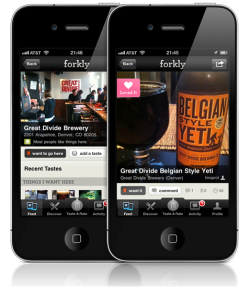Remember last year when it seemed like everyone was doing a location-based mobile app? One of the original players in that space, Brightkite, eventually got overshadowed by newer rivals. Now two of its founders are back with a new mobile startup, and once again they’re entering a space that is quickly getting crowded: food.
 Specifically, Brady Becker and Martin May have just launched Forkly into the App Store. While we’ve known about the company for almost a year, and known generally what they were doing for several months, it took quite a long time to get to this point. Now it’s here: an app for sharing and discovering food and drinks.
Specifically, Brady Becker and Martin May have just launched Forkly into the App Store. While we’ve known about the company for almost a year, and known generally what they were doing for several months, it took quite a long time to get to this point. Now it’s here: an app for sharing and discovering food and drinks.
If this sounds familiar it’s because you’ve heard of Foodspotting, the popular food picture app that now has a million downloads. Or maybe you’ve heard of Nosh, the new “Instagram of food” from a founder of Google Voice that launched recently. And those are just two competitors. There are many others, and trust me, many more coming in short order.
But to its credit, Forkly looks very solid. Unlike Foodspotting, which focuses mainly on pictures, Forkly focuses more on ratings (Nosh focuses on both). You can “like” an item, “love” it, say it’s “okay”, or “not for me”. Forkly then uses this information to build up a “taste graph” for each user. This is then used to serve up other items you may like.
Or you can see new items served up to you in a social feed. And you can easily flag something to note that you “want it”. And you can write short reviews, etc.
There is also a gaming element in that users become “influencers” for recommending foods and drinks that others like.
Forkly also smartly offers tools for food bloggers, restaurants, and brands to use the service right off the bat. These could end up being the key stand-out features in the space. You can read more about that in their post.
So will Forkly be able to do what Brightkite could not — be the breakout of red-hot field? Considering that half of the competition hasn’t even launched yet, it’s way too early to tell. Being early didn’t help in the location space (in fact, you could argue that Dodgeball, which eventually led to the creation of Foursquare, was way too early), but it could here as startups race to get the most foods and ratings in their systems.


